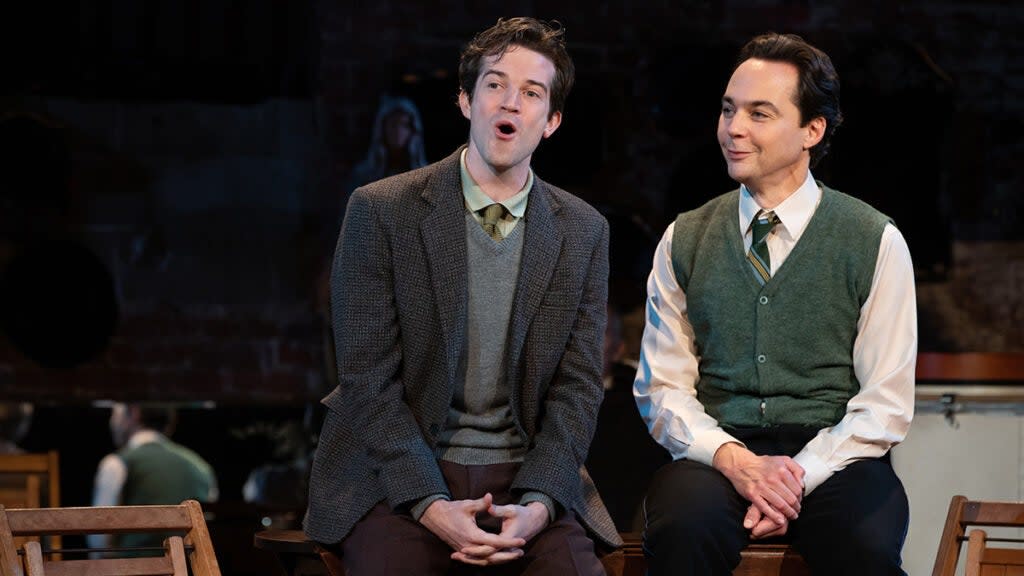‘A Man of No Importance’ Off Broadway Review: Jim Parsons Leads a Bloodless Musical Revival

- Oops!Something went wrong.Please try again later.
- Oops!Something went wrong.Please try again later.
- Oops!Something went wrong.Please try again later.
In his 12-season run as Sheldon Cooper on the hit sitcom “The Big Bang Theory,” Jim Parsons displayed a knack for dry humor and an awkward onscreen persona that seemed oblivious to social norms. It’s not hard to see why he might be drawn to Alfie Byrne, the closeted Dublin bus worker at the center of “A Man of No Importance,” the 2002 musical getting a kind-hearted but flat revival at Off Broadway’s Classic Stage Company.
Alfie is a quietly passionate fellow whose interests run from cooking to poetry to Oscar Wilde — not Sheldon’s field of theoretical physics. But the two characters share a certain social awkwardness even as they’ve both drawn a circle of admirers and supporters — for Alfie, both on the Dublin bus where he collects tickets and in the church community of St. Imelda, where he leads an amateur theater troupe in a series of short-lived productions.
But when Alfie decides to mount a production of Wilde’s often-banned play “Salomé,” he encounters resistance for the scenes of “immodest dancing” and frank intimations about sex. This is the 1960s, after all, a time when the Roman Catholic Church held great sway over Irish society. And the ensuing controversy, as well as his platonic fixation on his fresh-from-the-countryside leading lady (Shereen Ahmed) and not-so-platonic yearning for his driver and would-be leading man (A.J. Shively), lead him to grow bolder in finally accepting his homosexuality — to disastrous consequences.
Also Read:
Adele Reveals the Broadway Role She Thinks She Could ‘Nail’ to Win the EGOT (Video)
While Parsons has many of the qualities of Alfie, it’s clear from his opening lines that he is neither a strong singer nor a convincing Irishman (unless this Irishman grew up in Texas and emigrated as an adult). Even his looks of longing for his supposed crush seem buttoned-up, hidden somewhere beneath his cardigan. Of course, it doesn’t help that the story, adapted by Terrence McNally from a twee 1994 movie starring Albert Finney, already seemed dated when it premiered two decades ago.
The score, by Stephen Flaherty and lyricist Lynn Ahrens, reinforces the chamber-music quality of the piece, with snatches of Celtic music pastiche and some bouncy ensemble numbers that provide moments for the supporting cast to shine. (Shively and Ahmed are both vocal standouts, while Mare Winningham settles into her solos as Alfie’s long-suffering older sister with the comfort of a favorite pair of brogues.)
While there is a small band in the balcony, director John Doyle characteristically asks many of the ensemble to pull double duty as instrumentalists — and here the gambit helps to reinforce the let’s-put-on-a-show spirit of the troupe that we are meeting on CSC’s modestly dressed wooden thrust stage.
But Doyle’s production remains oddly lifeless — and even moments of violence pass by without so much as a blip to raise the blood pressure. It’s one thing to explore the effects of repressed emotions, but if those passions never bubble to the surface we’re left with a plot that carries no real weight or consequence. In the end, the title feels all too apt.
Also Read:
‘Montag’ Off Broadway Review: An Onstage Thriller About 2 Women in a State of Siege

